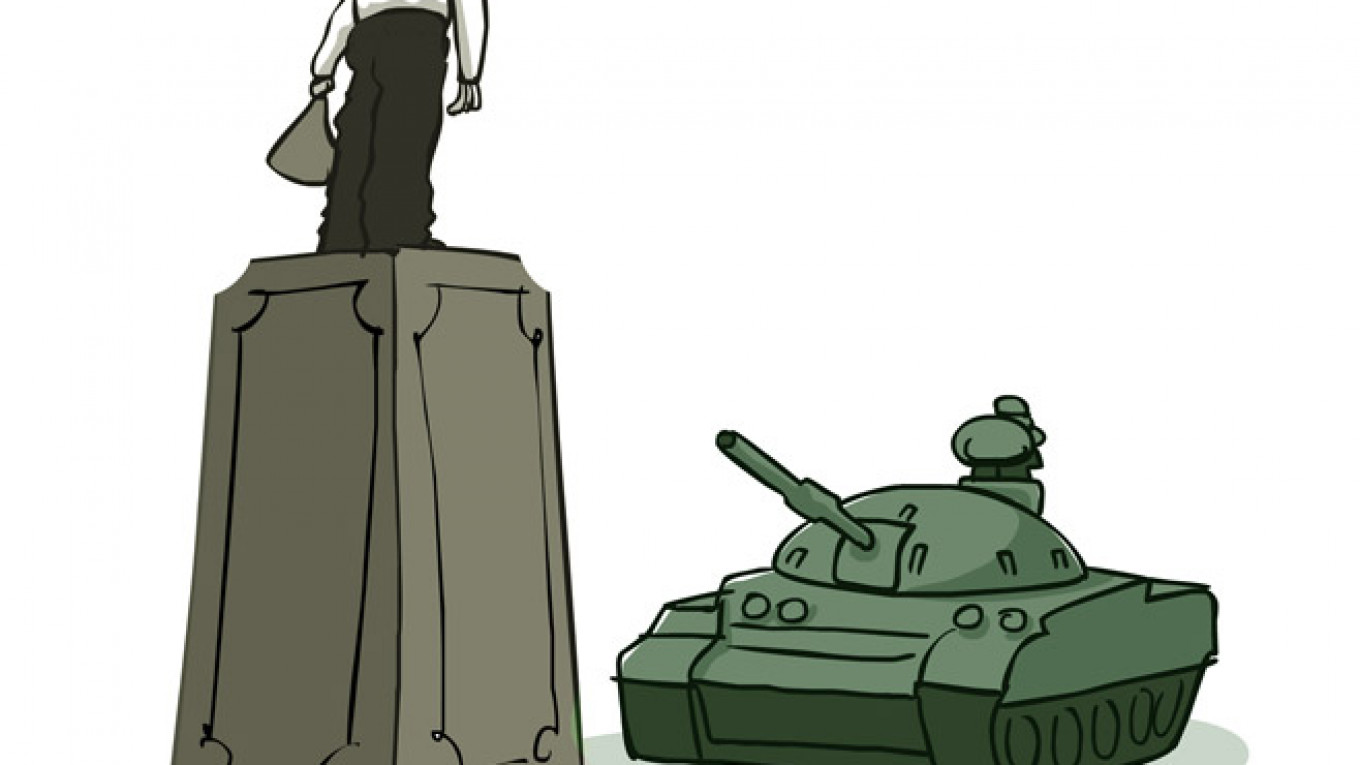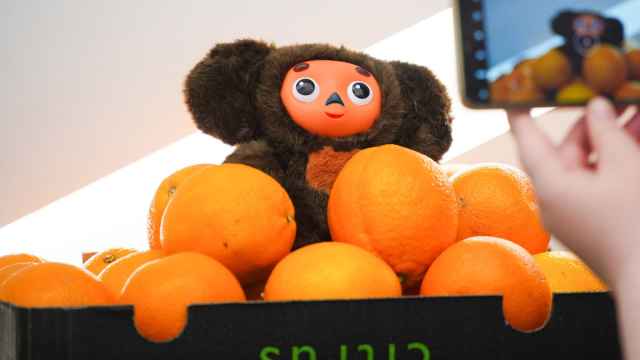"We Salute the Ambassador of Democracy," read one placard held by a protestor on China's Tiananmen Square in May 1989. The 25th anniversary of the pro-democracy protests and of the Chinese government's decision to crush them violently will be marked this year.
The influence of the protests on contemporary China, and on Beijing's continued authoritarian rule, will be widely noted. Yet the Tiananmen Square protests also left a profound and underappreciated legacy on Russia. Today, as Moscow redoubles its efforts to construct an anti-Western political entente with Beijing, Tiananmen underscores what is at stake for Russia's domestic politics in the country's new geopolitical orientation.
Russian business' turn toward China is derivative of a broader debate about Russia's ideological orientation, writes Chris Miller.
Who was the "Ambassador of Democracy" that protestors on Tiananmen saluted? Not a Chinese political reformer, or a Western human rights activist, but Mikhail Gorbachev, the last leader of the Soviet Union. Unrest had broken out on Tiananmen Square just days before Gorbachev arrived in Beijing on a state visit to reestablish normal relations between the two communist powers. Yet while Gorbachev was in China, it was not foreign relations but domestic politics that dominated the discussion.
In 1989, both the Soviet Union and China were in the midst of contentious debates about political reform. Gorbachev had staked his reputation on political liberalization — free speech and competitive elections — in an attempt to revitalize the Soviet Union's stagnant economy and decrepit political institutions.
China, too, was debating political reform in 1989, and many Chinese believed that the country should heed the "Ambassador of Democracy" and follow the Soviet Union's political reforms. Students at Peking University invited Gorbachev to speak to them about perestroika and glasnost. A student delegation from the city of Tianjin traveled to Beijing to greet the Soviet leader. And the protesters who occupied Tiananmen Square looked to Gorbachev's reforms as a model for changing China.
One woman on the square carried with her a copy of Gorbachev's book "Perestroika and New Thinking."
"This is an excellent book," she told a journalist. "I have read it twice."
Gorbachev and Soviet liberals embraced the notion that China and the Soviet Union were working jointly to reform and democratize socialism. For most of the 1980s, it was China, not the U.S.S.R., that had made the most progress in abandoning central planning, and Soviet liberals regularly pointed to China as an example of the benefits that market reforms could bring.
In Beijing, Gorbachev noted that Chinese students "welcome what the Soviet Union is doing along the road of perestroika and glasnost" and called on the Chinese government to work with pro-democracy protesters. If a situation like Tiananmen arose in the Soviet Union, Gorbachev told journalists, his government would resolve it "in the spirit of democracy and glasnost."
But unlike in the Soviet Union, the most powerful officials within China's ruling Communist Party were uninterested in democracy and saw the Tiananmen protests, as one leader put it, as a "stinking mess."
Immediately after Gorbachev left Beijing, China's leader Deng Xiaoping purged the Communist Party of reform-minded officials and put several former leaders under house arrest. Democracy — or "Western-style" democracy, as Chinese officials described it — was of no interest to China, Deng explained. "China's greatest interest is stability — anything that benefits China's stability is a good thing. I never give an inch — ever." Deng ordered troops to crush the protests on June 4, 1989. At least several hundred demonstrators were killed.
Though some, like famed dissident Andrey Sakharov, called on the Kremlin to vocally condemn the violence, Moscow's official reaction to Tiananmen was muted, and the incident had little effect on relations between the two countries.
The more important effect was within Soviet politics. Before Tiananmen, China had been a model for liberals in the Soviet Union who admired the country's economic reforms and who were also impressed by the breakneck speed at which China's leaders abandoned Maoist terror and reformed its political system.
Tiananmen changed that. After June 4, 1989, many saw China exclusively as a model of authoritarian reform. The coup that the Soviet security services launched against Gorbachev in August 1991, was in part inspired by Beijing's apparent success in using the military to reassert order on Tiananmen Square.
Though the Soviet coup failed, the notion that democracy was too weak and pliable to effectively govern Russia — and that a "Eurasian" model, based on a strong hand, would work better —remained a standard trope in conservative Russian thinking.
More importantly, the Tiananmen crackdown did little to threaten China's impressive economic growth. China's economy grew by at least 8 percent per year during the 1990s, even as Russia's stagnated.
Some in Russia concluded that by providing a strong central state, Tiananmen actually laid the basis for China's success. Russia's business classes have never wanted political violence but some are convinced that China has proved that political liberalism hinders economic growth.
Yet the legacy of Tiananmen is not only about history. Deng's logic may dominate Russia's future, too. Russian officialdom is again abuzz with interest in China. The recently signed gas deal between Russia and China has whetted the appetites of Russian business about Eastern markets, and businessmen like Gennady Timchenko have signaled their desire to develop deeper relations with China.
Yet the turn toward China is derivative of a broader debate about Russia's orientation, east or west. This is above all an ideological question: What kind of society will Russia be?
Amid reinvigorated domestic propaganda and an assault on the previously free Internet, many in conservative Russian circles are again praising Eurasian political models, including China's, for providing a non-Western path of development.
A series of cultural crises, from Pussy Riot to Eurovision, have underscored to Russia's leaders the danger of decadent Western liberalism. And Ukraine's revolution has proven how threatening this liberalism can be.
No wonder Russia's political elite is looking to China for lessons about keeping the Western threat at bay. The Kremlin is right that Beijing has useful advice about marginalizing dissent and standing up to the West. But the anniversary of the Tiananmen Square crackdown on Wednesday serves as a reminder that whatever its benefits, Chinese-style authoritarianism comes with serious, even deadly, costs.
Chris Miller is a PhD candidate at Yale and is completing a book on Russian-Chinese relations.
A Message from The Moscow Times:
Dear readers,
We are facing unprecedented challenges. Russia's Prosecutor General's Office has designated The Moscow Times as an "undesirable" organization, criminalizing our work and putting our staff at risk of prosecution. This follows our earlier unjust labeling as a "foreign agent."
These actions are direct attempts to silence independent journalism in Russia. The authorities claim our work "discredits the decisions of the Russian leadership." We see things differently: we strive to provide accurate, unbiased reporting on Russia.
We, the journalists of The Moscow Times, refuse to be silenced. But to continue our work, we need your help.
Your support, no matter how small, makes a world of difference. If you can, please support us monthly starting from just $2. It's quick to set up, and every contribution makes a significant impact.
By supporting The Moscow Times, you're defending open, independent journalism in the face of repression. Thank you for standing with us.
Remind me later.






